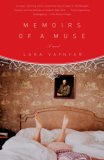Summary | Excerpt | Reviews | Beyond the Book | Readalikes | Genres & Themes | Author Bio

A Novel
by Lara VapnyarChapter One
A Parisian hotel room. A man sits at a round table across from a woman. There is a tea tray between them: two glasses in silver holders, with a transparent liquid changing from muddy brown to dark red depending on the light. A saucer with pale lemon wedges, a crystal sugar bowl, a plate of French pastry, two silver spoons lost on the shiny surface of the tray.
The woman is young, with a broad, well-defined face framed with heavy waves of auburn hair. Her lips are squeezed tight. Her small eyes are intense, alert. She is watching the man. The man is in his forties, short, heavy, with a scant beard and a lumpy bald patch, visible to the woman because his head is hung low. He has sinewy hands and the prominent forehead of a great Russian writer.
He is, in fact, a great Russian writer. He is Fedor Dostoevsky. And the woman is Apollinaria Suslova, his lover. Or his former lover, because she has just informed him that she has fallen in love with somebody else.
He is kneading his face with his hands. His large thumbs are stretching the skin on his cheeks, his index fingers are pressing into his temples. Beads of sweat form between the rare hairs on his crown and crawl down, lingering in every wrinkle on his forehead. Some of them dissolve in his skin, others make it as far as his brows, only to be crushed by his fast, cruel fingers. Two blue veins throb on his forehead. He is suffering. She can’t take her eyes away.
"Polya," he suddenly whispers. He raises his wet, shaking face to meet her eyes. "Have you given yourself to him? Have you given yourself completely?"
His voice is thin, hysterical. She recoils. Even now, now! That is all he could ever think about.
"I won’t answer that," she says.
"Oh!" he groans. His head drops back and his fingers resume their frenzy.
She stretches her legs under the table. She’d never imagined that inner turmoil could take such a physical form. She can smell the heavy odor of his sweat, she could reach with her hand and feel his veins throb under her fingers, she could taste his tears. She could take him into her arms and let her body shake with those powerful convulsions of his.
She doesn’t budge.
"Cruel, coldhearted, unkind," people called her.
Dostoevsky was one of them. "She desperately wanted and tortured herself to become somewhat kind," he wrote about one of his heroines, one of many inspired by Polina.
So was it true? Was she cruel? Does a muse have to be cruel? Does a muse have to be able to induce a certain amount of pain? I want to know that.
I want to know why I failed.
"Here, I see the brilliant, wondrous future spread out for both of you," the old governess said to little Polya and her younger sister, Nadya, pointing to the coffee cups with her clean, chubby hand. She had seated the girls around the big, empty table and placed a coffee cup in front of each of them. Polya climbed onto the seat of her chair and peered into her cup. The dim candlelight made their plump, round-faced governess look like a mysterious sibyl.
"You see that? See that?" the governess said, pointing at the barely visible holes and furrows in the grounds in Nadya’s cup. "Our Nadya will be a heroine, a conqueror. She will fight for a great cause, she will reach unreachable heights."
Nadya nodded—she saw the furrows.
"Now, let’s look at yours, Polya." Polya licked her parched lips. "I see Polya as a great beauty and as a great conqueror too, but she will conquer men’s hearts and inspire them. She will be a muse."
Later Polya sobbed in her bed, pounding on the mattress with her little fists. She saw a muse as a lapdog with a devoted expression in her wet, bulging eyes. She wanted to be a heroine. She didn’t want to be somebody’s lapdog!
Excerpted from Memoirs of a Muse by Lara Vapnyar Copyright © 2006 by Lara Vapnyar. Excerpted by permission of Pantheon, a division of Random House, Inc. All rights reserved. No part of this excerpt may be reproduced or reprinted without permission in writing from the publisher.




Read the best books first...
Click Here to find out who said this, as well as discovering other famous literary quotes!
Your guide toexceptional books
BookBrowse seeks out and recommends the best in contemporary fiction and nonfiction—books that not only engage and entertain but also deepen our understanding of ourselves and the world around us.